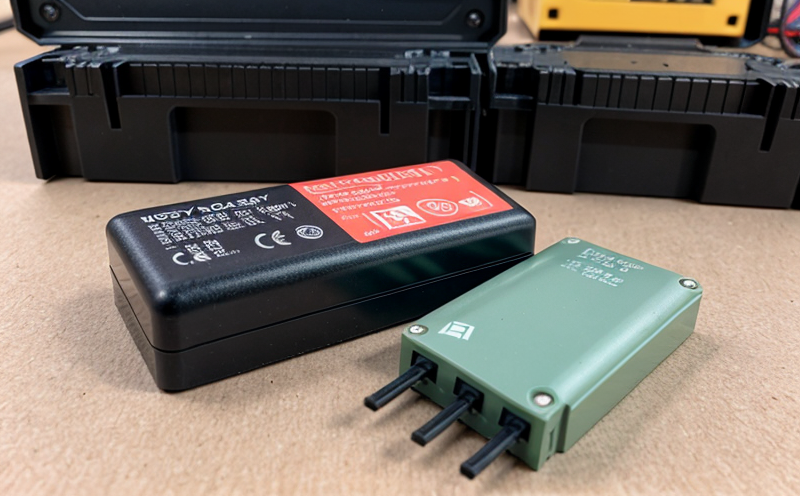UNE EN 62660-2 Lithium Battery Module Performance Testing for Road Vehicles
The UNE EN 62660-2 standard is specifically designed to ensure the safety, performance, and reliability of lithium battery modules used in road vehicles. This European Norm (EN) sets out detailed procedures and requirements aimed at safeguarding both drivers and passengers by minimizing risks associated with lithium-ion battery failures.
The testing process under UNE EN 62660-2 involves a series of rigorous tests to evaluate the electrical, mechanical, thermal, and functional performance of battery modules. These tests are critical for ensuring that the batteries meet stringent safety requirements set forth by international standards such as IEC 61960 and ISO/IEC TS 18153.
One of the key aspects of this standard is the emphasis on preventing thermal runaway, which can lead to catastrophic failures. Thermal management systems are rigorously tested for their ability to dissipate heat efficiently during high-power discharges or charging conditions. This ensures that even under extreme operating conditions, the battery remains stable and does not pose a risk to the vehicle or its occupants.
The standard also covers other important parameters including internal resistance measurement, which helps in assessing the overall health of the battery module. Other tests include charge/discharge efficiency checks, cycle life testing, and abuse condition simulations like overcharge, over-discharge, short circuit, and mechanical shock.
For quality managers and compliance officers, adherence to UNE EN 62660-2 is crucial for ensuring that the battery modules used in their vehicles comply with all relevant safety regulations. R&D engineers can leverage this standard to innovate and improve the design of batteries by understanding the specific requirements laid out in the document.
The testing process typically involves a comprehensive set-up where various components are connected according to the specified circuit diagrams provided within the UNE EN 62660-2 documentation. Specimen preparation is critical, ensuring that each battery module tested is representative of the production batch it belongs to.
Instrumentation plays a pivotal role in this testing process. High-precision measurement equipment capable of accurate voltage and current readings is essential for capturing data during charge/discharge cycles. Thermal imaging cameras are used to monitor temperature changes throughout the test duration, providing real-time insights into thermal distribution within the battery module.
The results from these tests form part of a detailed report that includes graphical representations of performance metrics such as capacity retention over time and voltage profiles under different loading conditions. This data is invaluable for quality assurance teams who use it to make informed decisions about production processes, material selection, and design improvements.
Compliance with UNE EN 62660-2 not only enhances the safety of electric vehicles but also contributes positively towards reducing environmental impact by promoting sustainable battery technologies. By adhering strictly to these standards, manufacturers ensure that their products meet stringent quality benchmarks set globally.
Applied Standards
- UNE EN 62660-2: Battery modules for road vehicles - Part 2: Performance testing
- IEC 61960: Safety of rechargeable energy storage systems (RESS) for electric road vehicles
- ISO/IEC TS 18153: Guidelines for the design and development of lithium-ion batteries
- ASTM G178-20a: Standard test method for open-circuit potential measurement of rechargeable cells
- UL 2580: Safety requirements for portable rechargeable energy storage systems (RESS)
The application of these standards ensures that the battery modules manufactured meet international safety and performance criteria. Compliance with such stringent regulations helps protect consumers while fostering innovation within the industry.
Industry Applications
- Automotive manufacturers developing electric vehicles (EVs)
- R&D departments focused on improving battery technology
- Quality assurance teams ensuring product safety and reliability
- Procurement managers selecting reliable suppliers for critical components
- Regulatory bodies overseeing the safety standards of EVs
- Safety organizations promoting safer vehicle designs
- Environmental groups advocating for sustainable energy solutions
- Insurance companies assessing risks associated with electric vehicles
Battery module testing under UNE EN 62660-2 is essential across these sectors to ensure that the technology used in EVs meets all necessary safety and performance benchmarks.
Customer Impact and Satisfaction
The implementation of rigorous battery module performance testing according to UNE EN 62660-2 significantly impacts customer satisfaction by enhancing overall vehicle safety. By reducing the risk of fires or other hazards related to lithium-ion batteries, customers can enjoy a more secure driving experience.
For automotive manufacturers, meeting these stringent standards translates into better brand reputation and trust among consumers who are increasingly concerned about the safety of electric vehicles. This commitment to high-quality manufacturing processes also supports long-term relationships with suppliers and stakeholders within the industry.
R&D engineers benefit from this standard as it provides clear guidelines on how to design safer, more efficient batteries. Compliance ensures that new models entering the market meet all necessary requirements without delays due to unforeseen safety issues.
Quality assurance teams play a crucial role in ensuring that every batch of battery modules produced adheres strictly to UNE EN 62660-2 standards before being incorporated into final products. This meticulous approach fosters customer confidence and satisfaction knowing they are receiving reliable parts.
Procurement managers find this standard particularly useful when sourcing components from suppliers who must demonstrate compliance with international safety norms. It simplifies the process of evaluating potential partners based on their adherence to these stringent criteria.
Regulatory bodies use UNE EN 62660-2 as a benchmark for enforcing safety regulations across different countries, thereby promoting uniformity in standards worldwide. This consistency reassures both manufacturers and consumers about consistent quality levels among various brands.
Safety organizations appreciate the role of this standard in setting new benchmarks for lithium-ion battery technology, which ultimately contributes to safer vehicles on roads everywhere.
Environmental groups welcome such stringent testing methods as they support efforts towards reducing carbon emissions through increased adoption of electric vehicles. By ensuring that batteries perform reliably and safely throughout their lifecycle, these standards contribute positively towards sustainability goals.
Insurance companies incorporate UNE EN 62660-2 compliance into risk assessment models for EVs, providing more accurate premiums based on actual safety performance rather than anecdotal evidence or assumptions about battery reliability.





